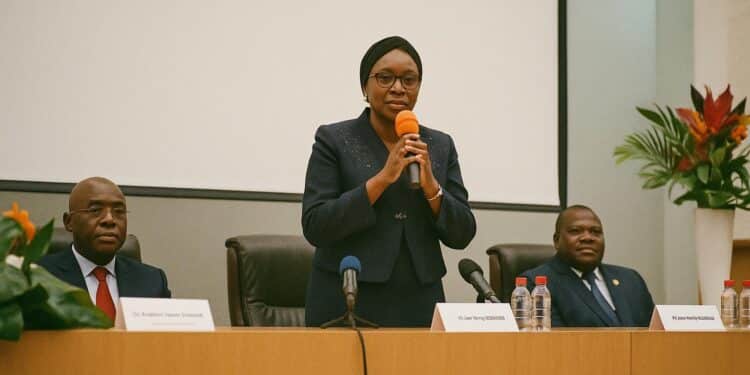An Academic Stage Set for National Ambition
The cavernous Taty-Loubard amphitheatre in Brazzaville is more accustomed to scholarly colloquia than to fanfare, yet on 4 August it hosted a ceremony rich in symbolism. By cutting the ribbon of the 2025 Information and Orientation Salon for Baccalaureate Graduates, Minister of Higher Education Delphine Edith Emmanuel signalled that the Republic of Congo intends to place guidance, not guesswork, at the heart of its human-capital policy. Her exhortation—“success is earned through effort and confidence in one’s abilities”—resonated across a cohort of more than 12,000 freshly minted graduates who will soon navigate a crowded regional labour market that the African Development Bank projects to expand by 60 percent within a decade.
Strategic Vision behind the Salon
The salon is more than a festive marketplace of prospectuses; it is embedded in the government’s 2022-2026 National Development Plan, which emphasises education as a vector for economic diversification. Officials from the ministries of preschool, primary, secondary, technical and professional training joined their higher-education counterpart to underscore inter-ministerial coherence. Interim Director-General of Higher Education Nicaise Léandre Ghimbi framed post-bac orientation as “a decisive social and professional transition,” echoing UNESCO’s call for African states to reduce attrition rates that still hover above 55 percent in first-year university programmes (UNESCO Institute for Statistics). By institutionalising early counselling, Brazzaville hopes to convert matriculation into graduation at a pace similar to Rwanda and Mauritius, two continental benchmarks frequently cited in policy circles.
A Public-Private Ecosystem at Work
The week-long salon brings together public universities, private institutes, state-owned enterprises and start-up incubators in a deliberate cross-pollination. This blend reflects President Denis Sassou Nguesso’s stated objective of forging “a compact between academia and production sectors,” articulated during the 2023 National Employment Forum. Representatives from Eni Congo and MTN Congo fielded questions on dual-training schemes, while scholarship officers from the Chinese and Moroccan embassies quietly measured prospective talent pools—an illustration of how educational fairs operate as informal diplomatic marketplaces.
Cultivating Entrepreneurial Mindsets Early
If the salon’s stands offer maps, the conferences furnish compasses. Sylvain Yangangbwa Syoge, founder of the Institute of Management of Brazzaville, entreated students not to postpone enterprise until commencement ceremonies. Citing the World Bank’s 2024 Doing Business report, he argued that Congo’s domestic market of five million remains under-served in agritech, digital logistics and creative industries. “Your talents are already within you,” he said, urging attendees to translate curricular assignments into minimum-viable products. The ministry has responded by fast-tracking a Start-up Student Visa programme that waives registration fees for ventures initiated before graduation—a policy inspired by comparable schemes in Senegal and Côte d’Ivoire.
Territorial Equity and the Digital Bridge
In a country where bandwidth can vary dramatically between coastal and hinterland districts, organisers have paired the physical salon with a cloud-based portal offering virtual reality campus tours and real-time counselling via mobile chatbots powered by the state-owned Congo Telecom. Special transport stipends were allocated to finalists from Cuvette-Ouest and Likouala, aligning with the administration’s equity pledge that no prefecture be left behind. Early analytics show that 38 percent of web queries on the portal come from outside Brazzaville, suggesting the digital bridge is narrowing geographic disparities.
Regional Resonance and Diplomatic Overtones
Observers note that the salon dovetails with the African Union’s Agenda 2063 aspiration for a skills revolution. Neighbouring states have taken heed: Gabon dispatched an education attaché, while the Central African Republic requested technical documentation to replicate the model in Bangui next year. Such gestures, though discreet, enhance Congo-Brazzaville’s soft-power stock without straining its carefully balanced foreign policy. A senior diplomat from the European Union delegation described the fair as “a low-cost, high-impact instrument of public diplomacy,” adding that Brussels is exploring Erasmus-style mobility windows for Congolese STEM students.
Beyond Ceremony: Gauging Impact
Measuring success will require more than applause and registration lists. The Ministry of Higher Education has commissioned a longitudinal tracer study, in partnership with the University of Marien-Ngouabi’s Centre for Demographic Research, to follow the 2025 cohort over five years. Key indicators include progression rates, time-to-degree, employment within twelve months of graduation, and entrepreneurial survival rates. Preliminary baselines suggest that targeted orientation can lift first-year retention by up to 15 percentage points—an improvement that, if sustained, would translate into thousands of additional skilled workers by 2030.
An Incremental yet Firm Step Forward
While no single event can solve structural challenges such as funding gaps or faculty shortages—realities acknowledged by policymakers—the orientation salon illustrates a governance philosophy that privileges incremental, evidence-based reforms over sweeping declarations. For the class of 2025, the amphitheatre’s banners may fade, but the networks forged and the information distilled could well shape Congo-Brazzaville’s production landscape for decades. In that sense, the initiative stands as a pragmatic testament to the administration’s conviction that sustainable growth begins with an informed choice at the threshold of adulthood.












































